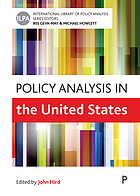

Legislation and public policy positions are never perfect and require careful study to iron out some issues. In this next section, you will explore how to analyze a public policy. Typically this requires exploring evidence highlighting the problem. This might include conducting surveys, gathering expert opinions, and examining specific cases related to the problem. Public policy analysts often use the rational policy analysis approach to evaluate a policy. Take a look at the three government oversight agencies and the reports they create on the legislation and policy area that we are researching.
Oversight agencies independent, non-partisan organization that analyze how legislations, congressional actions, or agency action effect the nation in terms of cost, efficiency, and legality.
Use all three of the following oversight agency to search for reports to gain insight and information on how to analyze your legislation or policy area.
GAO investigates how the federal government spends taxpayer dollars. GAO’s work is done at the request of congressional committees or subcommittees or as directed by public laws or committee reports. GAO's products include reports, testimonies, correspondence, and legal decisions and opinions. GAO also produces special publications to assist Congress and executive branch agencies by recommending corrections to problems in government programs and operations, identifying longterm trends, and examining the nation’s fiscal health.
CBO produces independent analyses of budgetary and economic issues to support the congressional budget process, including reports, projections, cost estimates, scorekeeping, sequestration reports, budget options, and others. CBO does not make policy recommendations.
CRS provides comprehensive research and analysis on all legislative and oversight issues of interest to Congress. CRS assists Members and staff with identifying and clarifying policy options; analyzing the implications of proposed policies; and assessing policy, procedural, and oversight options. Acting as a research extension to the staff of each Member and committee, CRS provides consultations, confidential memoranda, reports, briefing documents, videos, advice on process and procedures, expert committee testimony, and seminars.
Use the following exercises to learn more about your locating analysis on your policy area and legislation.
